How To Get Podcast Sponsors (Even If You're Just Starting Out)
How To Get Podcast Sponsors (Even If You're Just Starting Out)
Nov 19, 2024
Nov 19, 2024
Business
Business


Ever notice how many podcasts disappear after just a few episodes? Here's a surprising fact: 94% of shows never make it to episode 100. But here's what many new podcasters miss: you don't have to wait until you're "big" to start making money from your show.
Most people think you need thousands of listeners before sponsors will notice you. After working with both new and established podcasters, we've discovered something different: you might be able to land sponsors earlier than you expect.
Let's talk real numbers. Right now, podcast publishers typically earn $25 to $50 for every 1,000 downloads. That adds up — successful shows bring in anywhere from $700 to $13,000 monthly. Not bad for talking about what you love, right?
In this guide, we're diving into exactly how to make this happen for your show. You'll learn how to catch sponsors' attention, create a media kit that gets responses, and price your spots to close more deals.
What you need to land podcast sponsors
First things first, there are a few things you’ll want to have ready to open doors to sponsorship deals.
Your podcast media kit
Think of your media kit as your podcast's resume — it's the first thing sponsors look at. Here's everything you'll want to include:
Here are the components to include in your podcast sponsorship proposal:
About Your Show and About The Host (Yourself)
Podcast Overview (Description and Genre)
Audience Demographics and Listening Stats
Download Numbers
Social Media Engagement and Follower Counts
Advertising Options (Pre-roll, Mid-roll, Post-roll)
Testimonials and Listener Reviews
Notable Achievements or Awards
Previous Guests or Topics Covered
Audio or Video Trailer/Snippets
Sponsorship and Partnership Opportunities
Contact Information
Links to Podcast Platforms, Website, and Social Media
Ad rates in 2024
Here’s an overview of ad spots available in a podcast episode and how much they usually cost:
Pre-roll Ad CPM: ~$15 for 15-25 seconds
Cost for 100,000 listens (Pre-Roll): ~$1,500
Mid-roll Ad CPM: ~$30 for 30-60 seconds
Cost for 100,000 listens (Mid-Roll): ~$3,000
Post-roll Ad CPM: ~$10 for 15-25 seconds
Cost for 100,000 listens (Post-Roll): ~$1,000
What affects these rates? A few things:
Podcast Popularity: More listeners = higher CPM
Ad Length: Longer ads cost more
Host-read Ads: Priced higher than traditional ads
Campaign Length: Longer campaigns might mean better rates
Number of Ad Spots: Buying multiple spots can affect pricing
Listener Demographics: Niche audiences often mean higher CPM
Social Influence: Strong social media presence can boost rates
Your inventory: types of ads you can offer
Keep an updated inventory of available ad slots and any special promotional opportunities. This helps sponsors see the flexibility and variety of advertising options your podcast offers.
Here are some of the top podcast ad choices preferred by brands that you can include in your sponsorship proposal:
Pre-Roll Ads
Mid-Roll Ads
Post-Roll Ads
Host-Read Ads
Custom Episode Intros/Outros
Exclusive Episode Sponsorships
Sponsorship Mentions
Sponsored Segments
Live Reads
Product Placement
Custom Content Series
Ad-Free Episodes for Subscribers
Branded Show Notes
Collaborative Episodes
Promo Code Mentions
Banner Ads on Podcast Website
Social Media Shoutouts
Email Newsletter Features
Why brands love podcast advertising
This stat won’t surprise you: 61% of brands use podcast ads for brand building.
It makes sense — podcast advertising helps businesses connect with exactly the right people and grow their customer base. Let's break down why brands get excited about podcast ads:
They can reach their perfect match
With podcasting, brands can reach their buyers in a very targeted way.
BuzzSprout found that half of all listeners aged 35-44 tune in monthly, with 22% of the 55+ crowd joining in too.
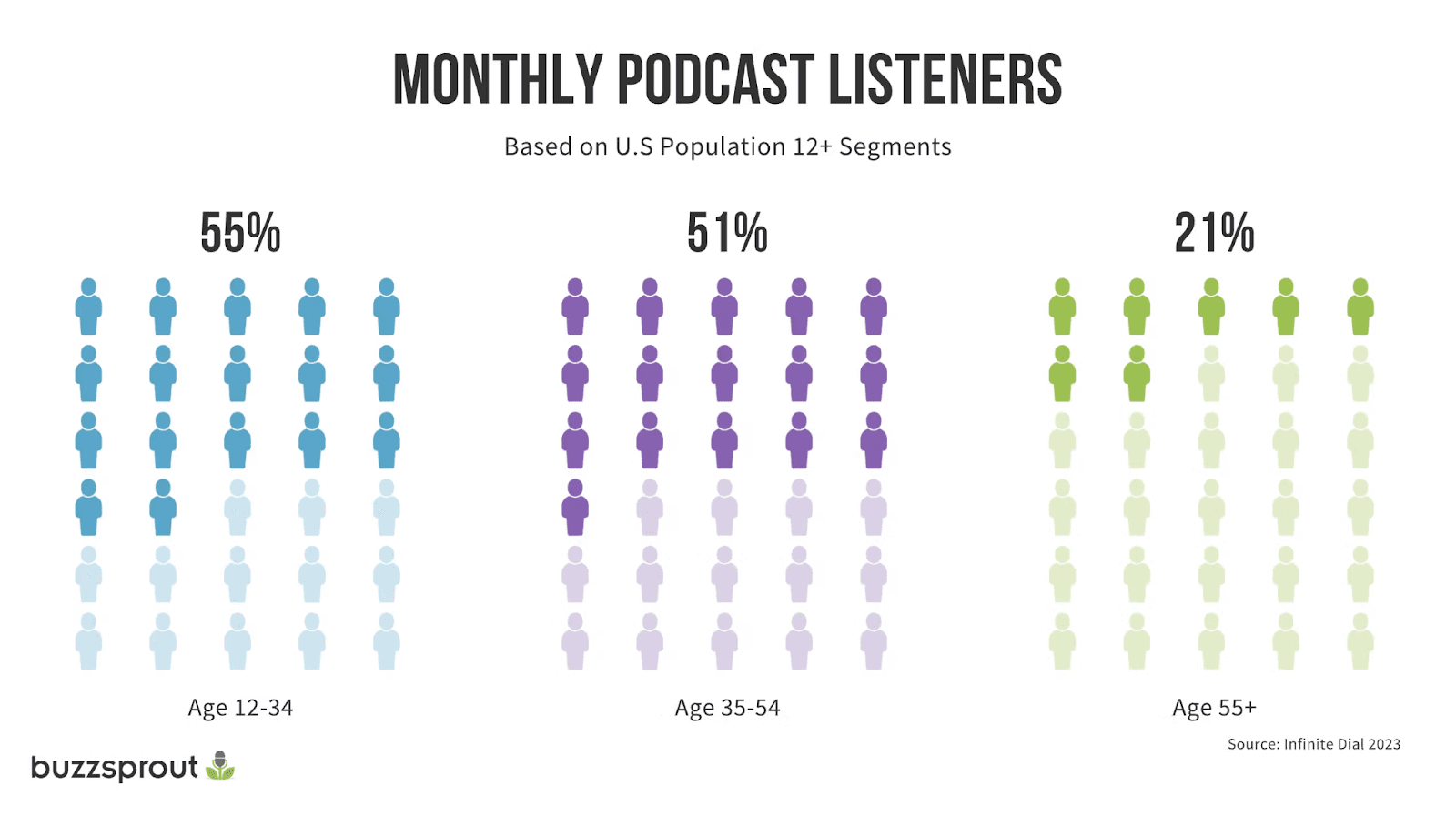
When you run a niche podcast, sponsors can fine-tune their message to match your listeners' interests perfectly. Here's the kicker: podcast ads deliver 4.9 times return on investment — beating out traditional advertising by a mile.
Your listeners are super engaged
Ever notice how podcast fans tend to be very engaged? About 40% of people are more likely to buy something after hearing it on a podcast versus seeing it on social media.
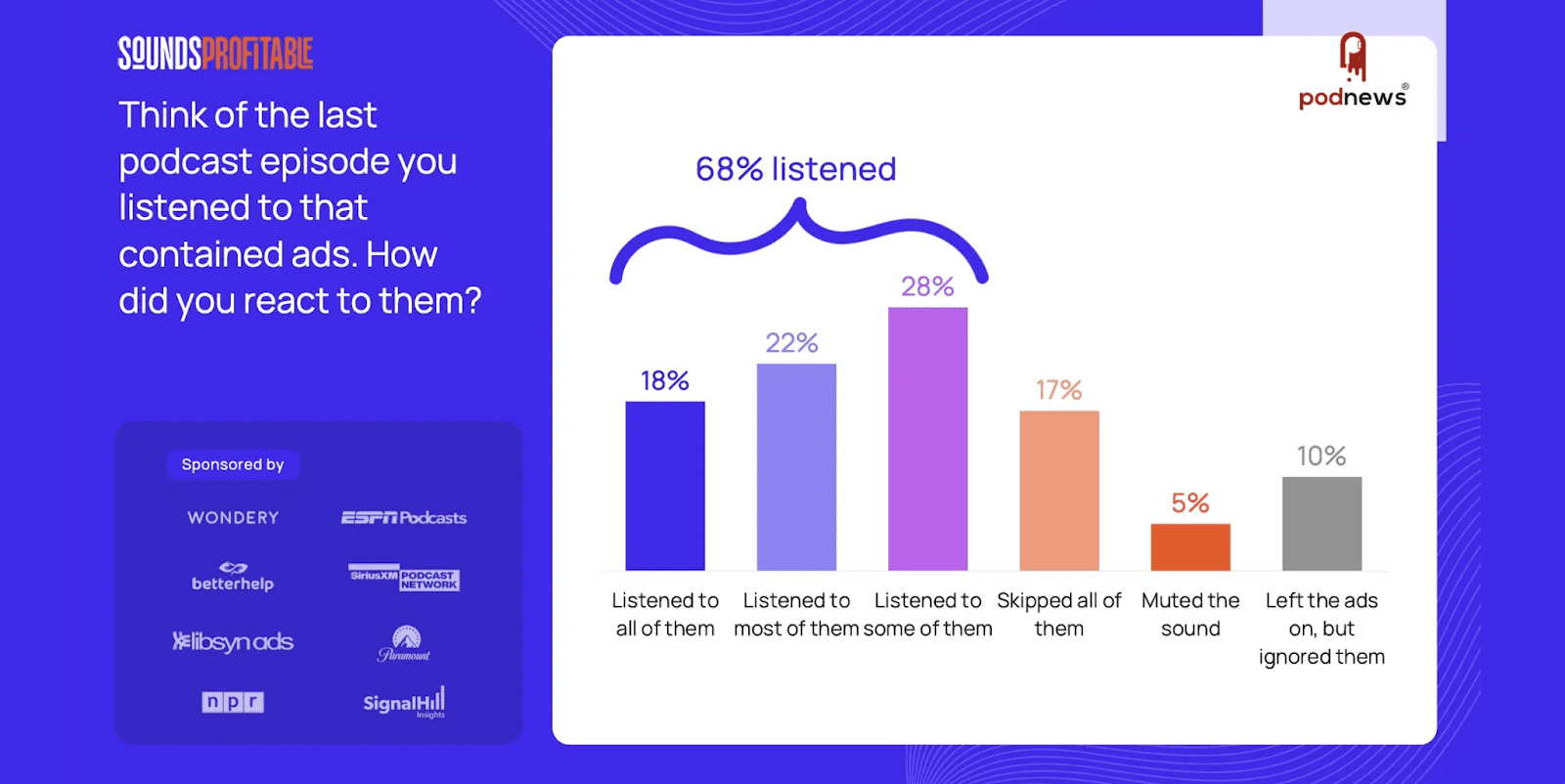
Brands love this because engaged listeners are more likely to become loyal customers. When your audience trusts you, they're more open to hearing about products that might actually help them.
Audio ads just hit different
There's something special about hearing an ad in someone's voice versus reading it on a screen. The proof is in the numbers: 74% of listeners visit company websites after hearing podcast ads, 72% think about buying, and 54% actually go to stores to check products out.
That's the power of audio advertising at work.
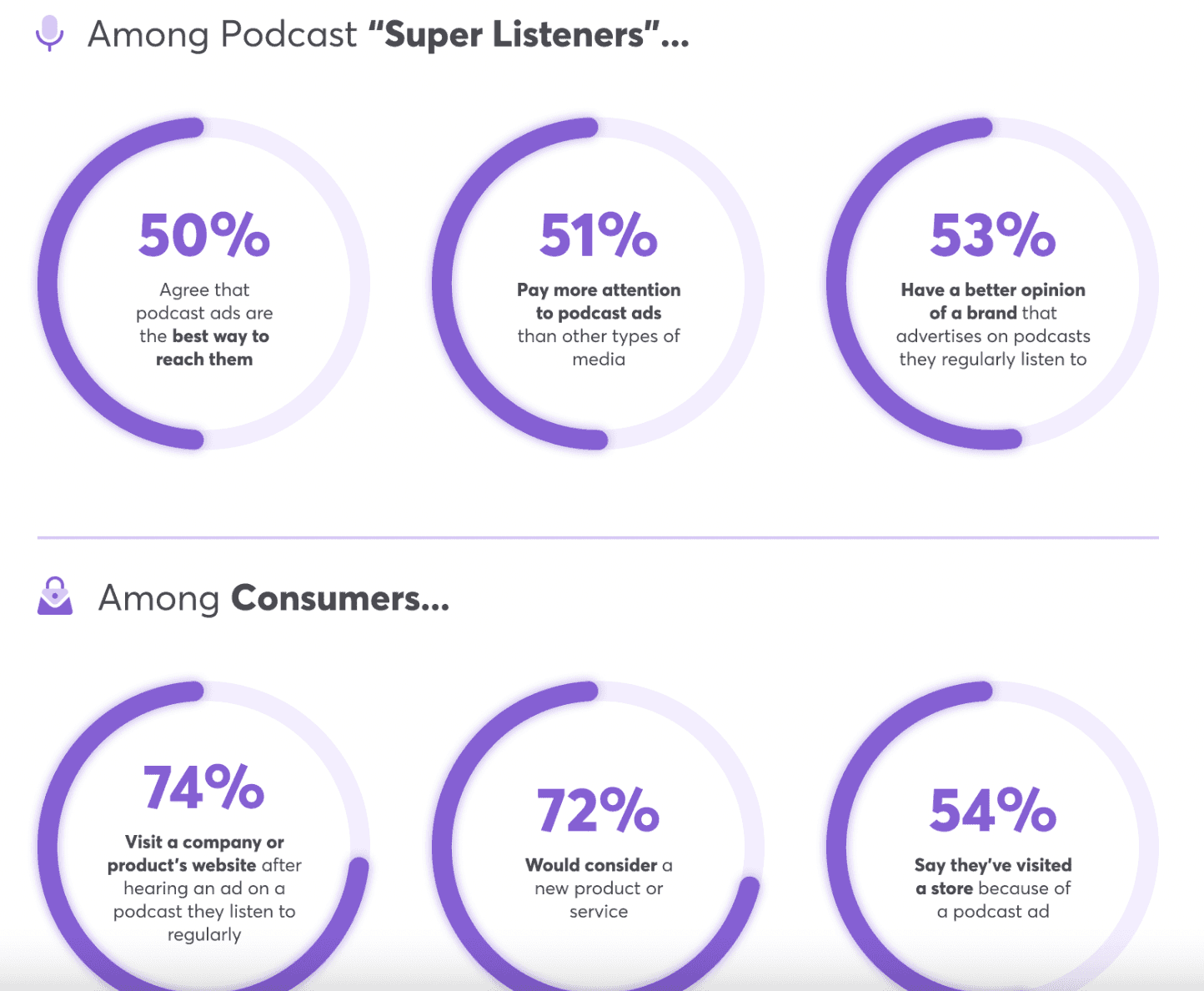
Trusted voices = better results
Here's something that makes advertisers' eyes light up: 71% of weekly podcast fans jump on new episodes within 24 hours of release.
When a familiar voice recommends something, it carries more weight — that's why 85% of people trust podcasts more than other news sources. That trust translates into action, from website visits to actual purchases.
Meet the brands betting big on podcasts
The podcast world is booming — we’re talking 546 million listeners worldwide, and advertisers are taking notice. By 2027, experts predict podcast advertising will hit a whopping $5.03 billion. That's not pocket change.
You'll spot plenty of familiar names in the podcast advertising space: Toyota, Squarespace, Amazon Music, Nissan, and Walmart, just to name a few.
Some brands are going all in, so let's look at the top three podcast advertisers in the U.S. BetterHelp leads the pack, dropping $24.6 million on podcast ads. Amazon isn't far behind at $15.6 million, and VGW rounds out the top three with $13.4 million.
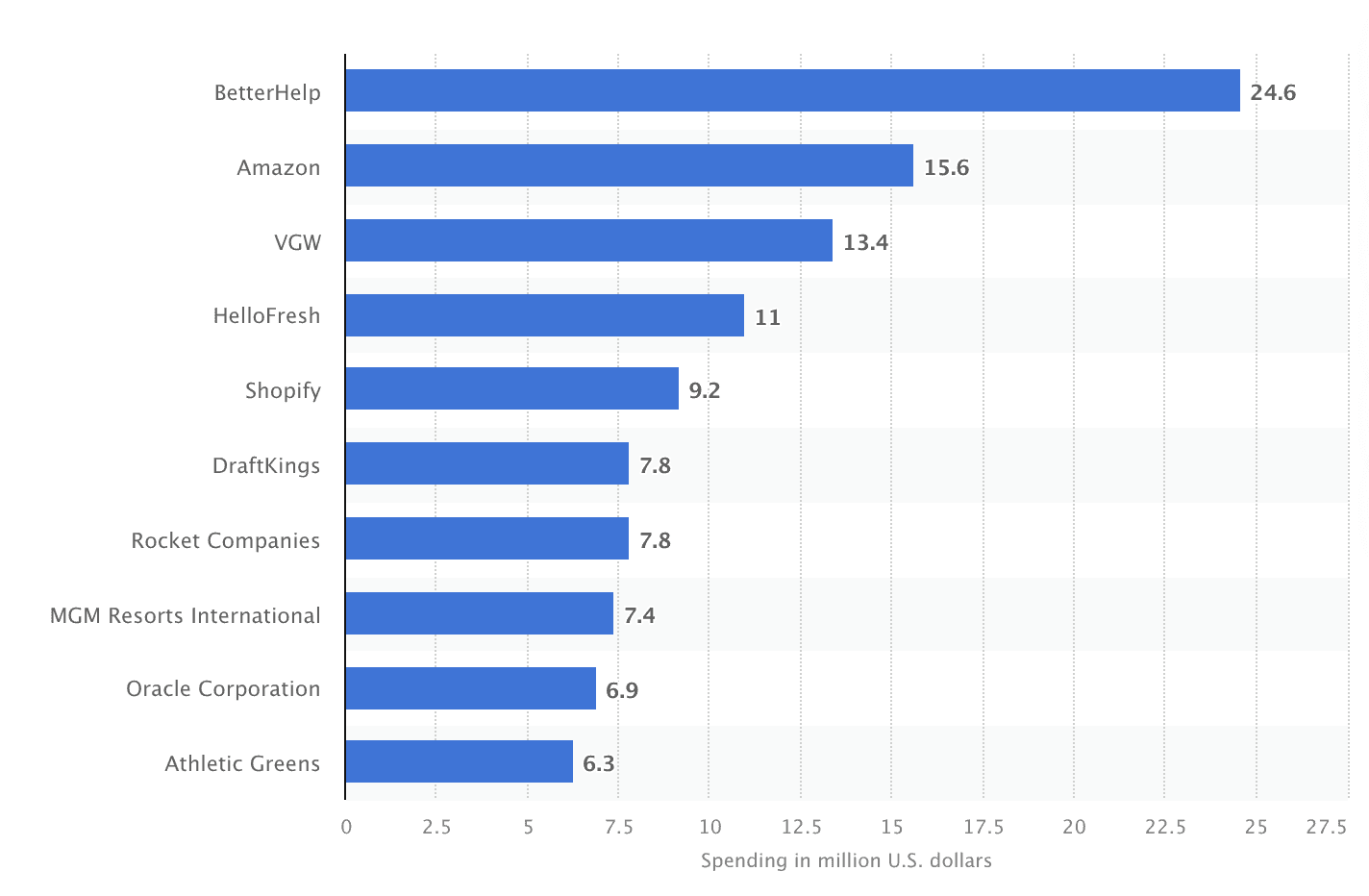
The podcast advertising game isn't just for the big players. Plenty of smaller companies are jumping in too, seeing real results in brand awareness and sales. In fact, some of the most interesting success stories come from businesses you might not have heard of yet.
Let's look at some real examples of how both small businesses and major brands have used podcast advertising to grow their audience:
What does this mean for you? Take a look at your podcast's topic. Which brands would be perfect matches for your listeners? These companies might be your future sponsors - they just don't know it yet.
The best part? Most companies aren’t aware of podcasts as an advertising medium and rely on other channels. You can be the one to open their eyes to the opportunity to be early movers in a space that’s still surprisingly open.
The types of ads you can offer
Let's talk about the different ways you can work with sponsors. Think of your podcast like prime real estate - different spots in your show have different values. Let's break down one of the most valuable spots:
Pre-roll ads
That's prime advertising territory, and here's why sponsors love it: listeners are fresh and ready to pay attention.
These ads get plugged in right at the start using something called dynamic ad insertion (fancy tech that makes switching out ads super easy). The best part? Most people don't skip the beginning of episodes, so sponsors know their message is actually getting heard.
Here's a real example that worked: Two Men and a Truck created a clever 30-second pre-roll ad for Spotify. They kicked it off with "Clutter can add up fast" - hitting a nerve with anyone who's ever felt overwhelmed by their stuff. Then they smoothly moved into their solution: trained movers, safe handling, and being there when you need them. Smart, right?
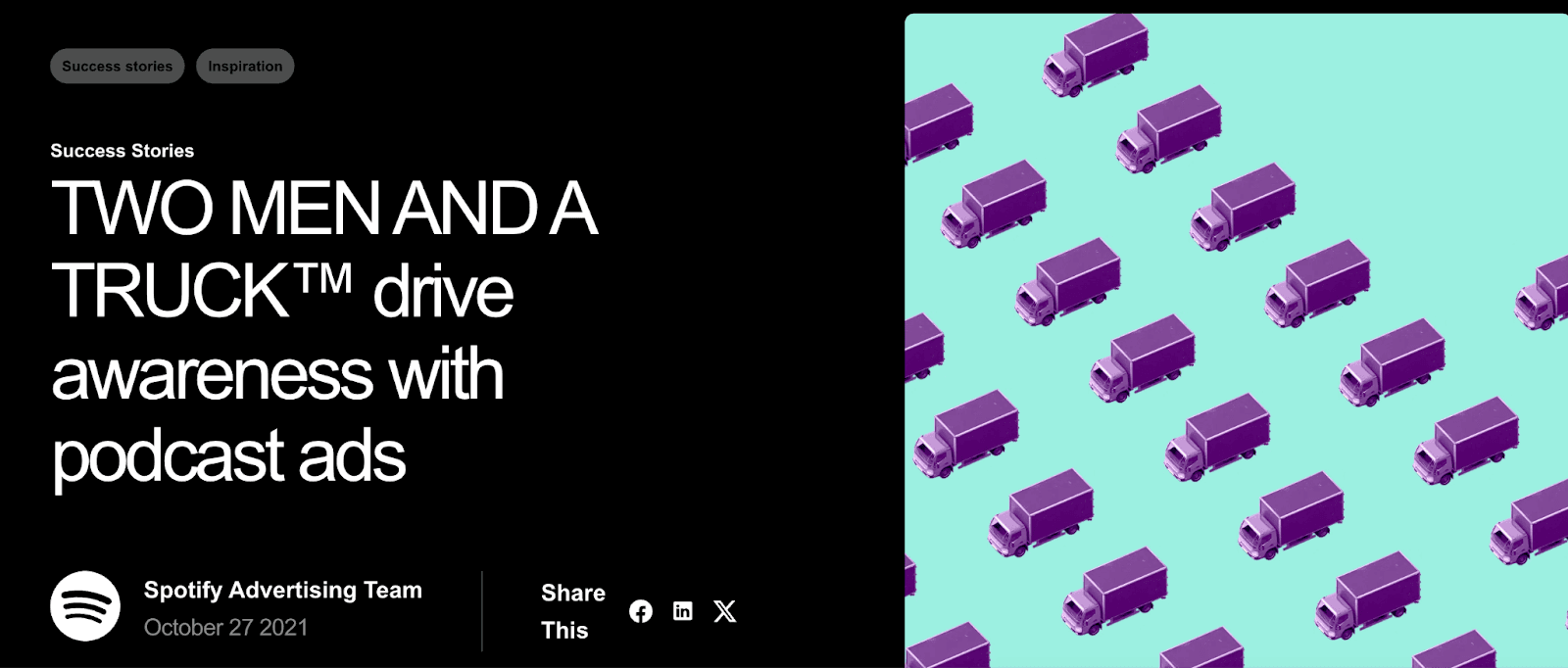
Mid-roll ads
By the time a listener hits the middle of your episode, they're hooked. They've settled in, they're invested in what you're saying, and they're actually paying attention. That's why mid-roll spots are so attractive to sponsors (and why they tend to cost more).
Here's what makes them extra special: you can weave these ads into your content naturally, almost like they're part of the conversation. And thanks to some clever tech called dynamic insertion, you can swap these ads in and out without having to re-edit your whole episode. That means your sponsors can keep their messages fresh and timely.
Take David Tennant's podcast, for example. In a recent episode where he interviewed Elizabeth Moss, he smoothly worked in some ads about 30 minutes in, right when listeners were deep into the conversation. The ads promoted other network shows, and because they were programmatic (fancy word for automatically inserted), they could be updated whenever needed.
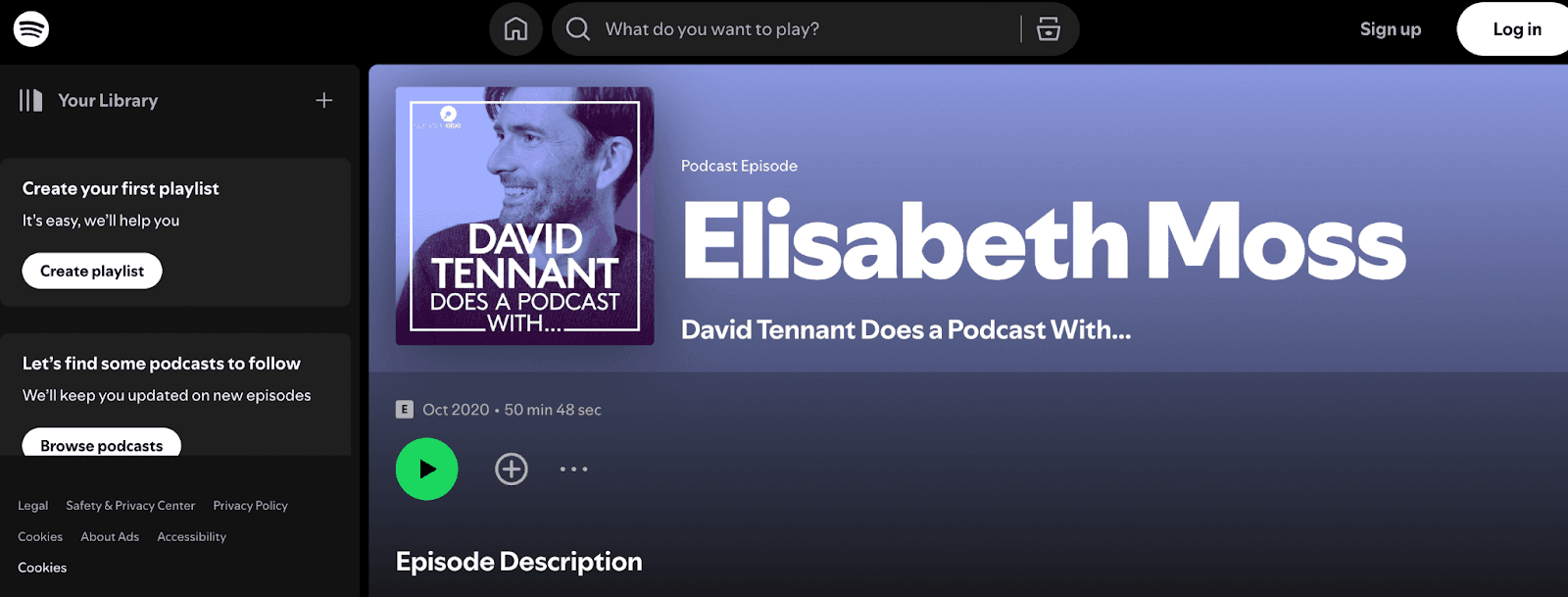
Post-roll ads
As you can deduce by now, these are ads placed at the end of an episode. While they might not grab as many ears as ads at the beginning or middle of your show, these end-of-episode spots have their own special power.
Here's the thing about listeners who make it to the end of your show: they're your super fans. They stuck around for the whole ride, which means they're more likely to pay attention to what you're recommending. And for sponsors? That kind of dedicated audience is pure gold.
You've got plenty of flexibility with post-roll ads too. Maybe one sponsor wants a quick 30-second spot while another needs more time to tell their story — you can make either work. Plus, since you're recording these ads ahead of time, you can make sure they flow perfectly with how your episode wraps up.
Host-read ads
Host-read ads are exactly what they sound like — you, talking about products you believe in. And guess what? These often turn out to be the most powerful ads of all.
Think about it. Your listeners tune in because they connect with your voice, your style, your take on things. When you weave a product recommendation into your natural flow, it doesn't feel like an interruption — it feels like getting advice from a friend. That's why listeners tend to remember these ads better than any other kind.
And here's some good news: technology's making this easier than ever. With programmatic host-read ads, you can customize your message for different listeners while keeping that personal touch that makes your show special.
Want to see this in action? Take a look at how BetterHelp does it. In episode 88 of The Ramsey Show, the host talked about online therapy in such a natural way, you might not have even realized it was an ad at first. It just felt like part of the conversation — and that's exactly why it worked.
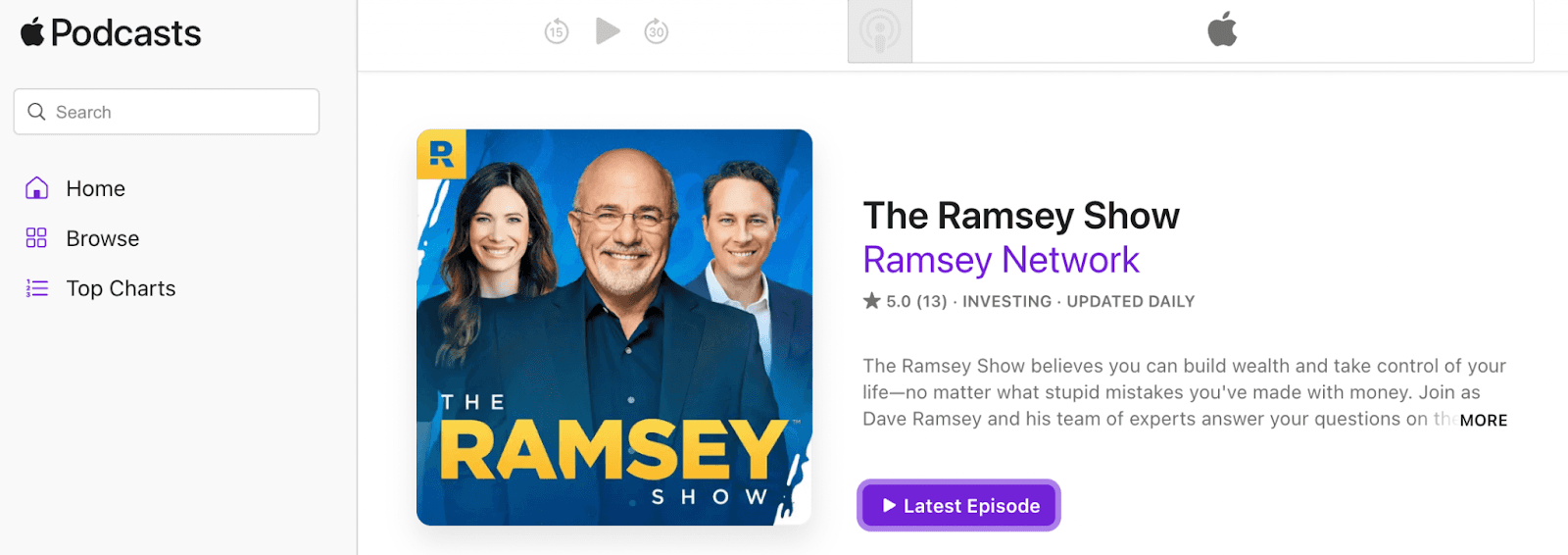
Product placement
Ever notice how some podcast hosts casually mention products in a way that feels totally natural? That's product placement in action, and it's becoming a smart way to earn money from your show.
Here's the thing about podcasting — since listeners can't see what you're talking about, getting creative with how you introduce products into your story becomes super important. It's all about finding those perfect moments to weave products into your narrative in a way that feels authentic.
Think of it like having a friend naturally recommend something they love — that's the same feeling you're going for with product placement. When done right, these mentions actually add to your story instead of interrupting it.
Want to see this in action? Take the psychological thriller Listening In with Rachel Brosnahan. In one of their episodes, the way they incorporated Johnnie Walker into the story shows just how creative you can get with product placement — it felt like part of the story rather than an ad break.
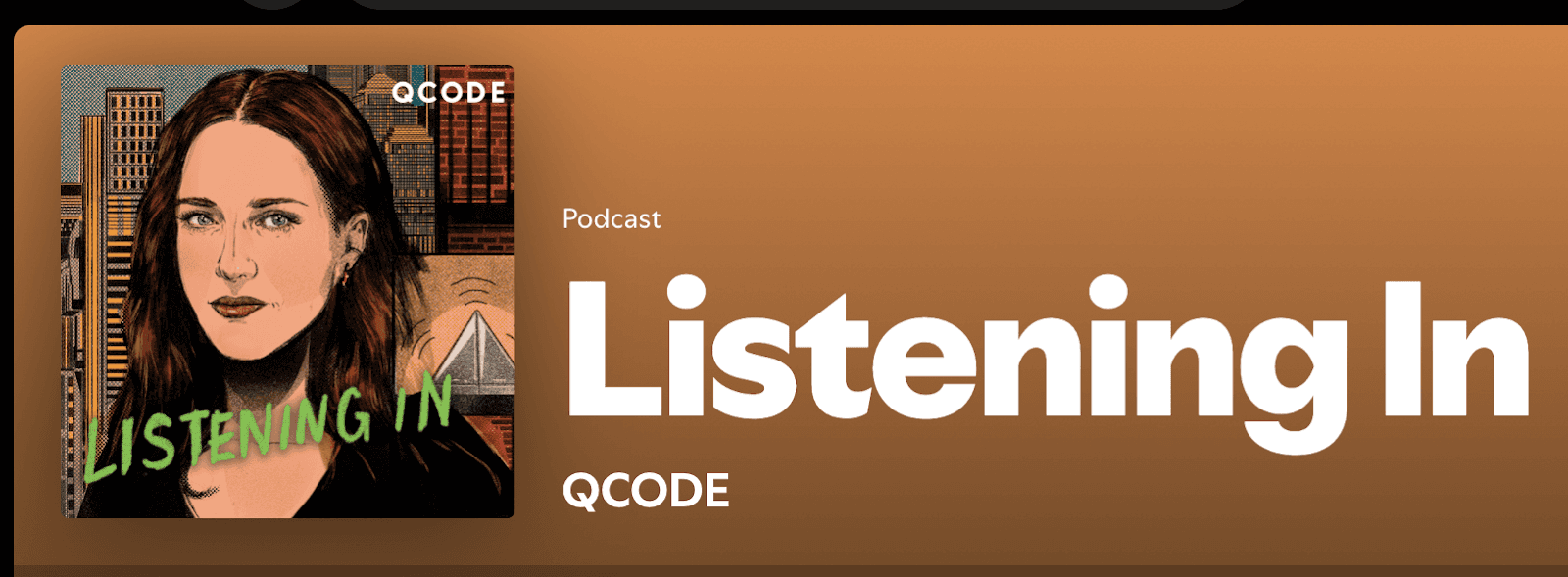
Instead of just talking about Johnnie Walker, the show creators got clever with it. They sprinkled in little audio details that put you right there in the scene: the gentle clink of ice cubes, the unmistakable sound of whiskey being poured into a glass. These tiny touches did more than just mention the brand — they created a whole mood and made the product feel like a natural part of the story's world.
Affiliate sponsorships
Here's a revenue stream many new podcasters overlook: affiliate sponsorships. Think of it as getting paid to recommend products you actually use and love. There's no need to wait for big sponsors to notice you, and you can start earning passive income right away.
By joining podcast affiliate programs like Amazon Associates, Audible, ExpressVPN, Redbubble, BarkBox, you can add affiliate links right into your content and show notes.
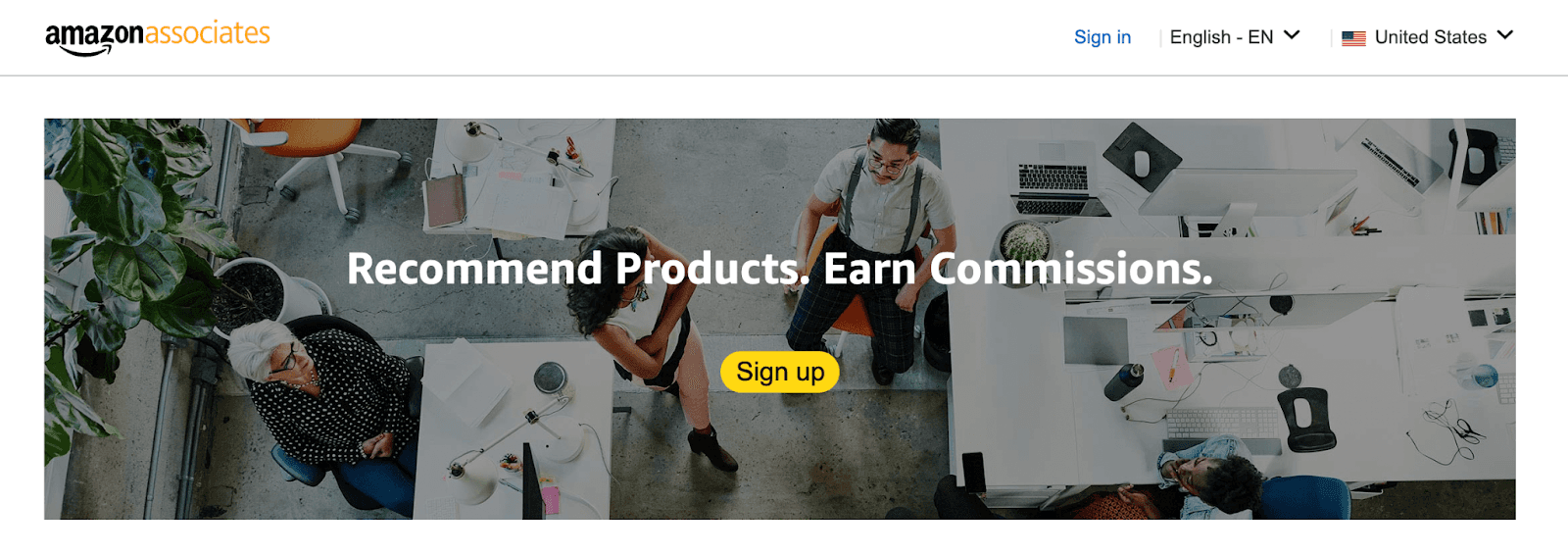
Here's the best part — every time your listeners make purchases through your unique affiliate links, you earn a commission from these programs.
Pricing models: breaking down CPM vs. CPA
Let's talk about the two main ways podcast sponsors pay for ads: CPM and CPA.
CPM = “Cost Per Mille,” which is just a fancy way of saying how much advertisers pay for every 1,000 listens to their ad. Think of it as paying for eyeballs (or ears) on their message.
CPA = “Cost Per Acquisition,” which is where sponsors only pay when your listeners take action, like signing up for their service. It's all about results rather than just reaching people.
Let’s break this down further:
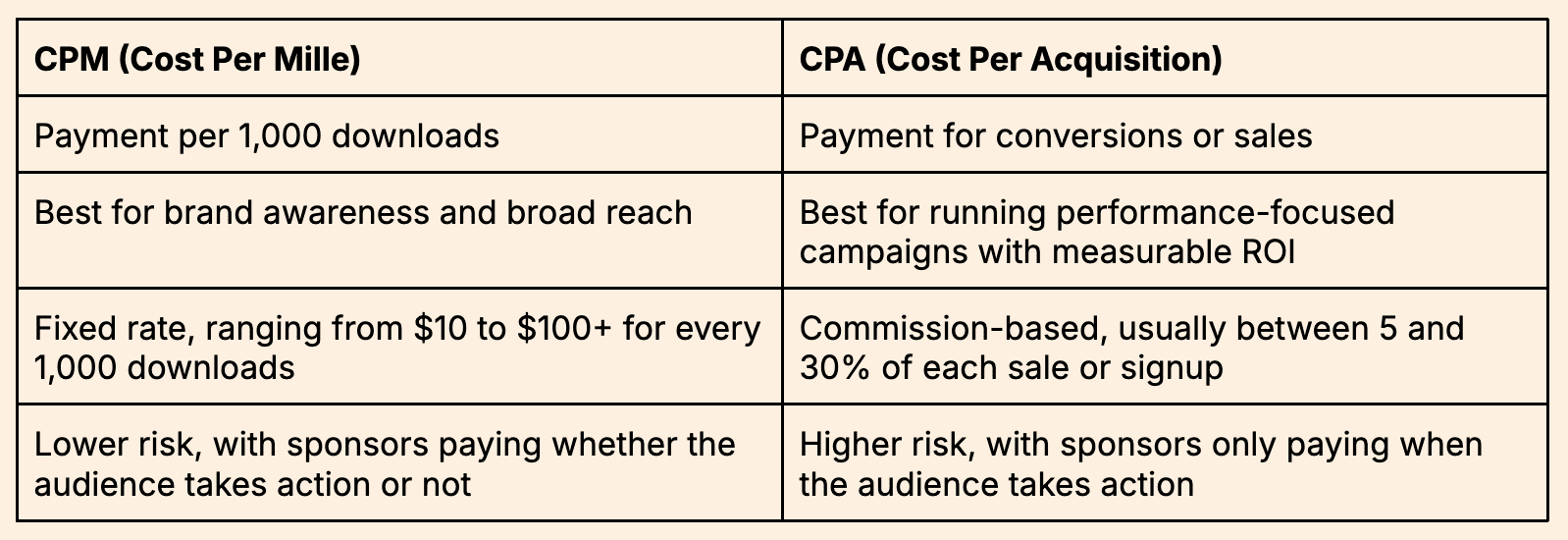
Beyond CPM and CPA, here are other pricing models you can offer sponsors, each with its perks:
Flat Rate: Keep it simple with a set fee for each sponsor spot, no matter how many downloads.
Programmatic Ads: Think of these as automated ad spots sold through networks. They typically earn less than host-read ads, but they're super easy to manage.
Monthly Retainer: Perfect for long-term partnerships, where sponsors pay the same amount each month like clockwork.
Dynamic Ad Insertion: This lets you pop ads into your older episodes too. The price changes based on reach and campaign duration.
Engaging with sponsors
Let's dive into the exciting part: getting your podcast sponsored. Finding the right sponsors isn't just about making money — it's about building relationships that last and creating income you can count on.
Here are the best ways to connect with advertisers who'll be a great fit for your show:
Getting support from listeners
Let's talk about one of the most straightforward ways to fund your podcast: asking your listeners for support. Here's a rundown of platforms that make it super easy to accept contributions:
Quick and Simple Donations
PayPal for easy one-time or recurring support
Buy Me a Coffee when listeners want to show quick appreciation
Ko-fi for fee-free contributions
Venmo and Cash App for instant transfers
Zelle for direct bank-to-bank support
Membership and Subscription Platforms
Patreon — offer exclusive content and tiered perks
Supercast — create premium ad-free episodes
Podfan — give special access and shout-outs
Podbean Patron — reward listeners with exclusive content
Substack — combine premium newsletters with your podcast
Fundraising Tools
GoFundMe for specific project goals
Fundly for special initiatives
Indiegogo when you're planning bigger expansions
Content Sales and Direct Support
Gumroad to sell extras like e-books or transcripts
Stripe for custom payment processing on your website
Anchor Listener Support built right into your podcast platform
PayPal.me for sharing your personal donation link
Liberapay for recurring support without platform fees
Hustle & Co for monthly subscription income
Reach out to sponsors like a pro
Looking to connect with potential sponsors directly? Here's how to make your outreach count.
Start by finding sponsors who truly fit your show, then craft an email that tells your podcast's story. Got a creative idea for them — like a mini-series that aligns with their brand? Don't be shy about pitching it.
Here are the numbers that make sponsors sit up and pay attention:
Who's listening? Break down your audience's age, location, and interests
How many people tune in to each episode
Your monthly growth trend
How your listeners engage through likes, shares, and comments
The percentage of listeners who stick around till the end
Your listener loyalty stats
Your social media presence and reach
Real feedback from your audience
Success stories from past sponsorships
How many people visit your website through the podcast
Pack all this into a clear, punchy pitch that shows sponsors exactly what they'll get — and don't forget to spell out your sponsorship options.
Here is an example a podcaster we know used to land a new sponsor:
Subject: Partnership Opportunity: Feature [Brand Name] in Our [Topic] Podcast
Hi [Sponsor’s Name],
I'm [Your Name], creator of [Your Podcast Name], where we dive into [content/theme]. I noticed that our audience — [relevant demographics] — matches perfectly with who you're trying to reach.
I've attached our media kit that shows our download numbers, listener details, and how we connect with our community on Instagram, Twitter, and Facebook.
Here's what makes us different: we offer a fresh format that keeps listeners hooked and gives your brand lasting exposure. We're planning a mini-series about [topic], and I think your brand would be a perfect fit.
I can already see how [mention brand/products] naturally fits into this conversation, and I'd love to explore ways to weave in your message that serves both our listeners and your goals.
Let me know if you’d be interested in exploring what’s possible.
Best,
[Your name]
Find sponsors through podcast marketplaces
Here's another way to connect with advertisers — tap into podcast advertising platforms that offer both automated and host-read opportunities. These marketplaces make it easier to grow your podcast revenue:

Podcorn is a top marketplace that treats podcasters like influencers when it comes to native advertising.
Here's what makes it great: you can jump right in and browse sponsorship opportunities without getting tied down by contracts. Plus, no long waits for your money — once your content is approved, you'll get paid within 24 hours.
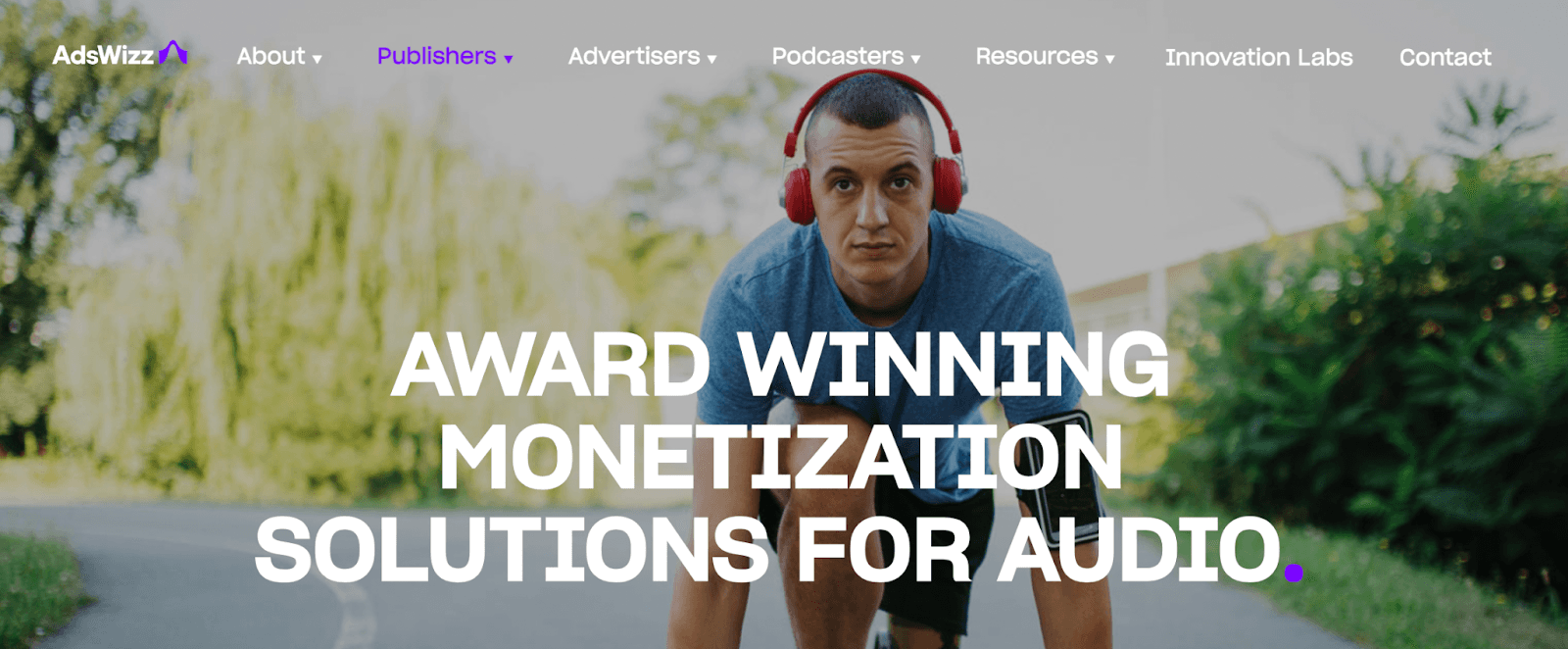
AdsWizz is one of the biggest marketplaces in podcast advertising, reaching over 255 million monthly global unique listeners.
Their programmatic selling platform makes it simple to sell your audio ad space. Through their AudioMax SSP technology, podcasters can maximize their revenue by connecting with 80% of global advertisers.
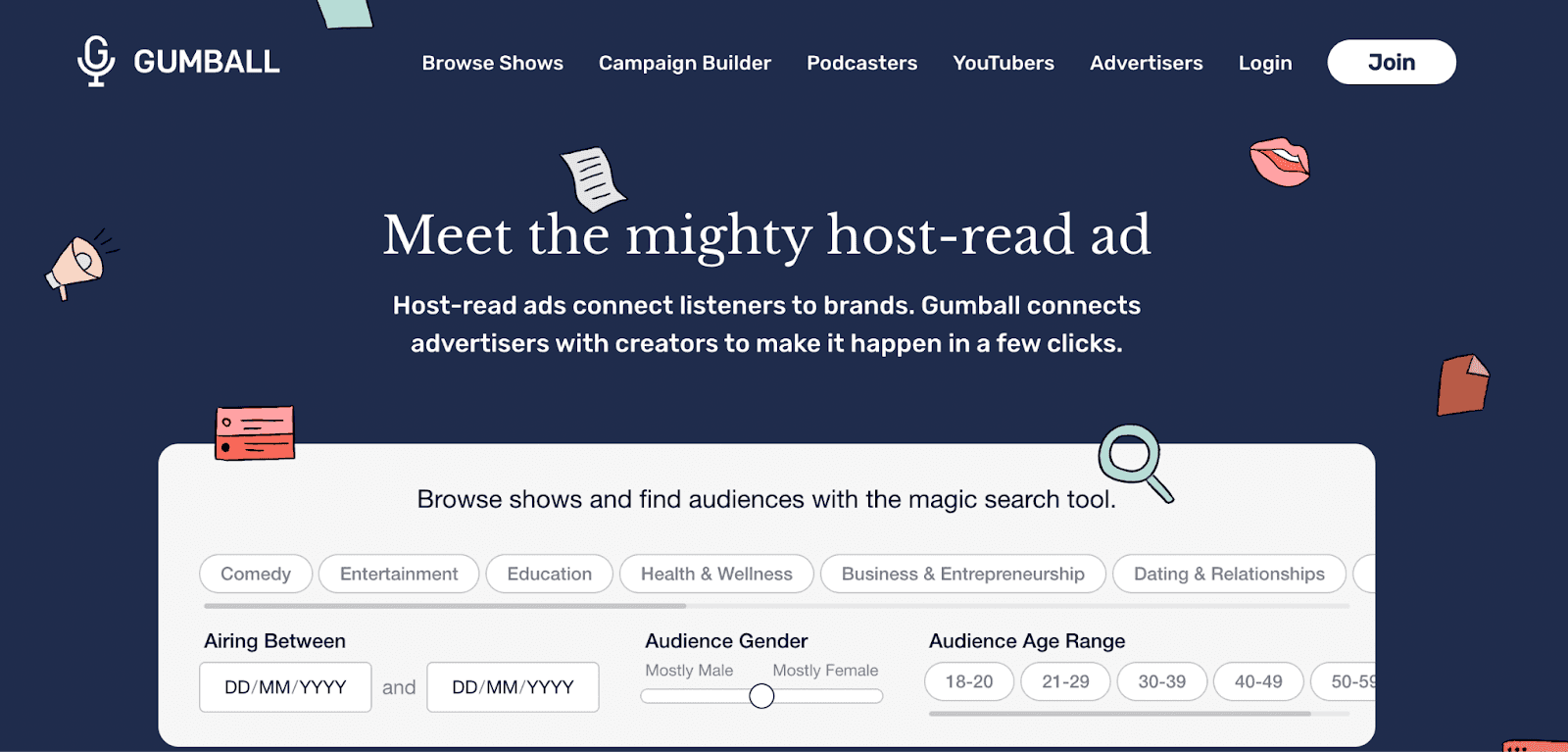
Here's what makes Gumball special: they focus on host-read ads, connecting over 980 top brands with more than 1000 podcast creators.
The platform handles all the advertising tracking for you, and thanks to their LightningPay system, you'll get your earnings fast.
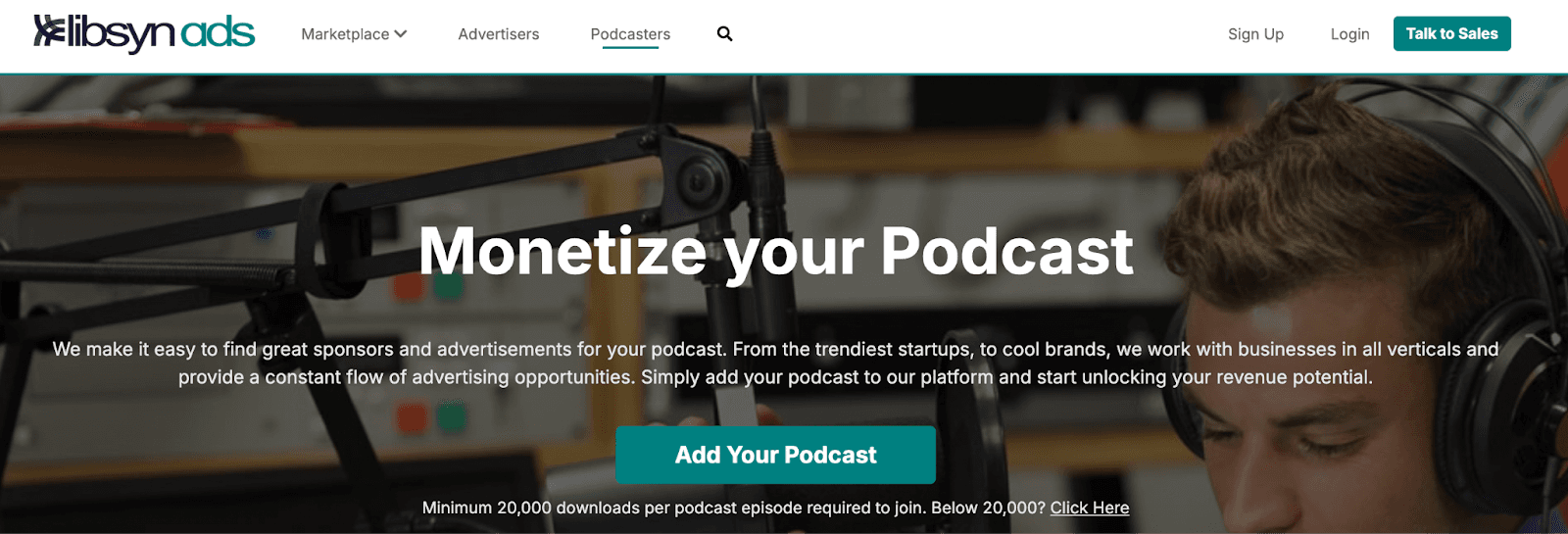
Libsyn Ads opens doors to all kinds of advertisers: you'll find everyone from up-and-coming startups to established brands.
Just add your podcast to their platform to unlock new advertising opportunities. Once you're in, their team helps create your marketplace listing and set up your ad spots. The best part? You keep full control over which ads appear on your show.
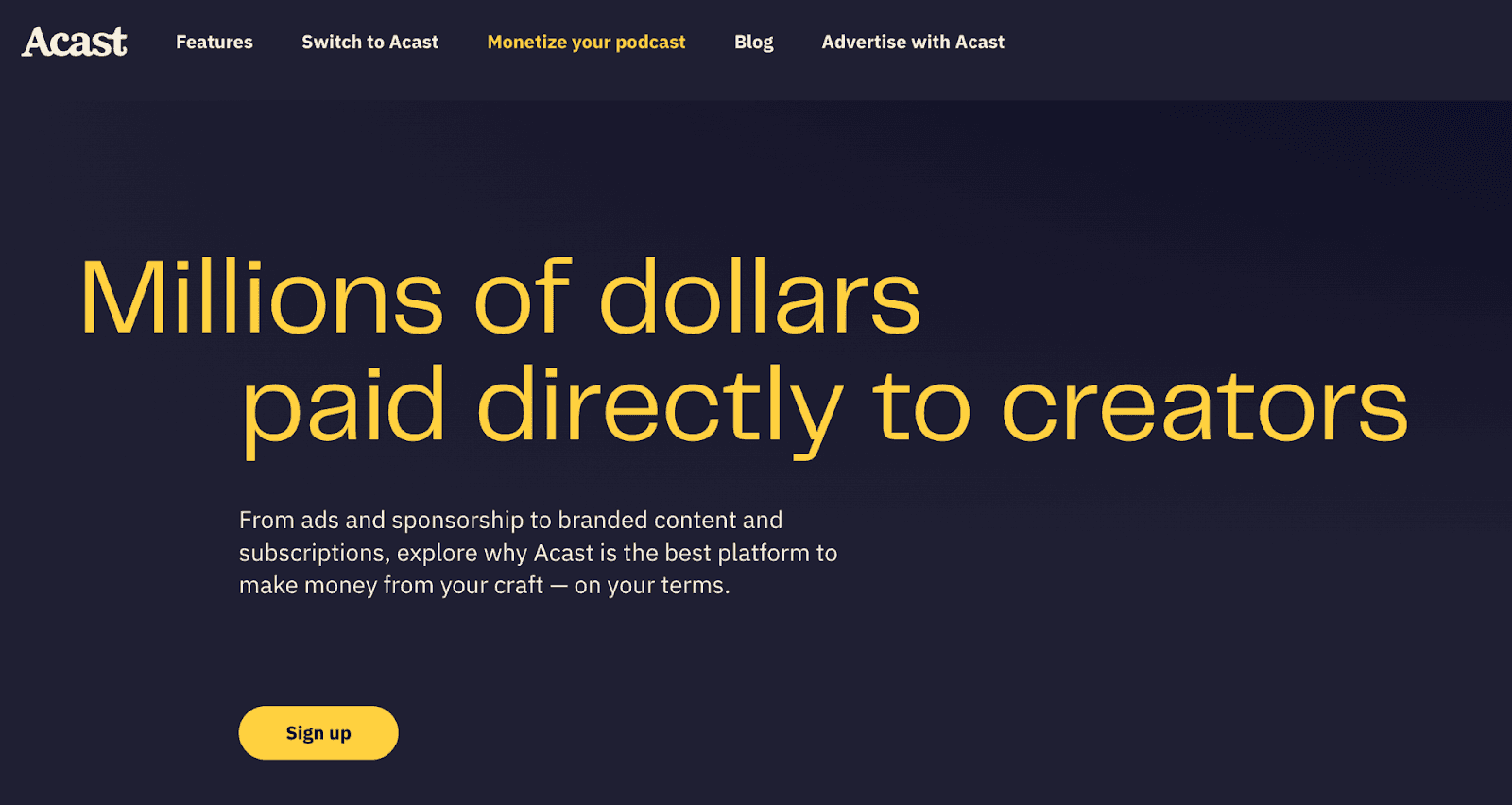
Acast handles the heavy lifting by hosting and distributing your podcast everywhere that matters: Apple Podcasts, Google Podcasts, Spotify, and beyond.
Their dynamic ad insertion lets you control exactly where ads go in your episodes while their team brings quality brands to the table. With innovative ad technology and a global sales force, Acast connects over 2,300 top advertisers with creators, helping you earn consistently.
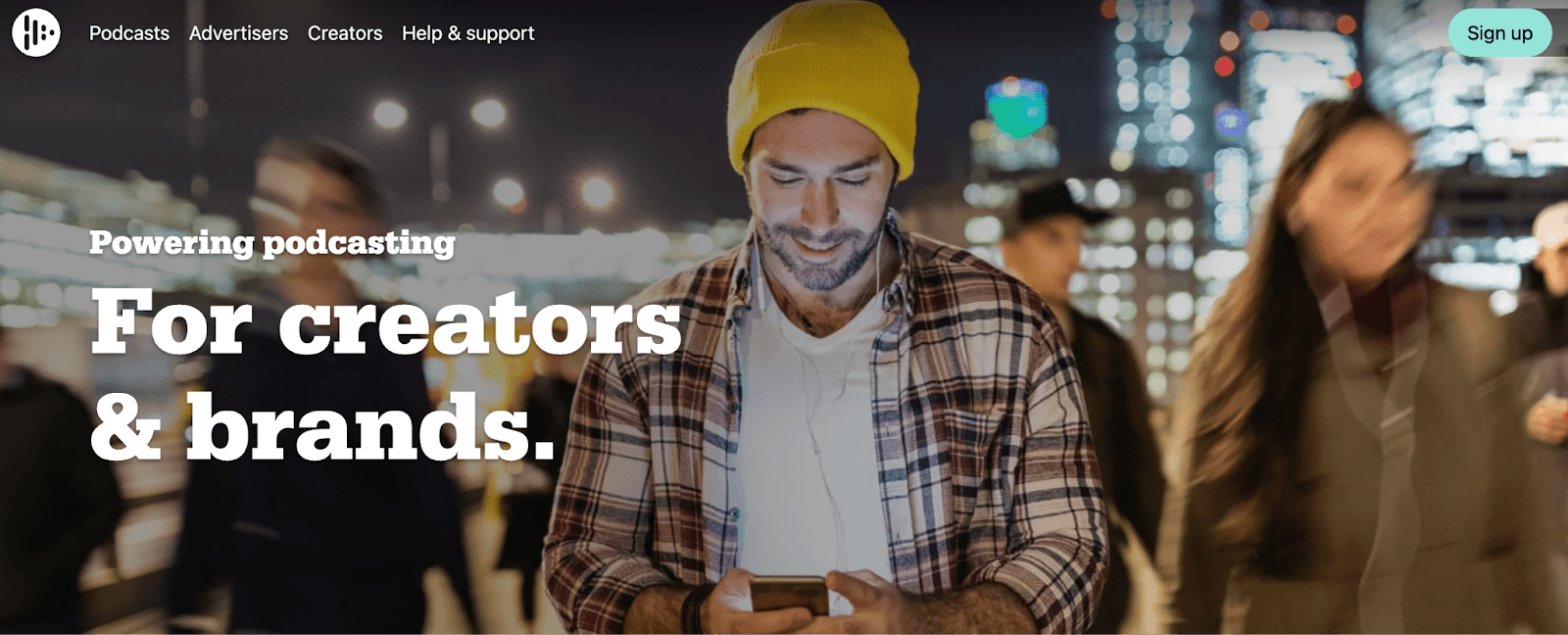
Audioboom connects podcasters with top-tier advertisers while helping you build your brand alongside podcasting's biggest names.
Their Showcase feature brings you a global advertising marketplace where you can target campaigns by genre, location, keywords, and listener demographics using dynamic ad insertion. Better yet, you'll get your own account manager and access to detailed insights powered by IAB Podcast Measurement Standard 2.1 certified partners like Triton Digital and Voxnest, giving you great tools to hit your revenue goals.
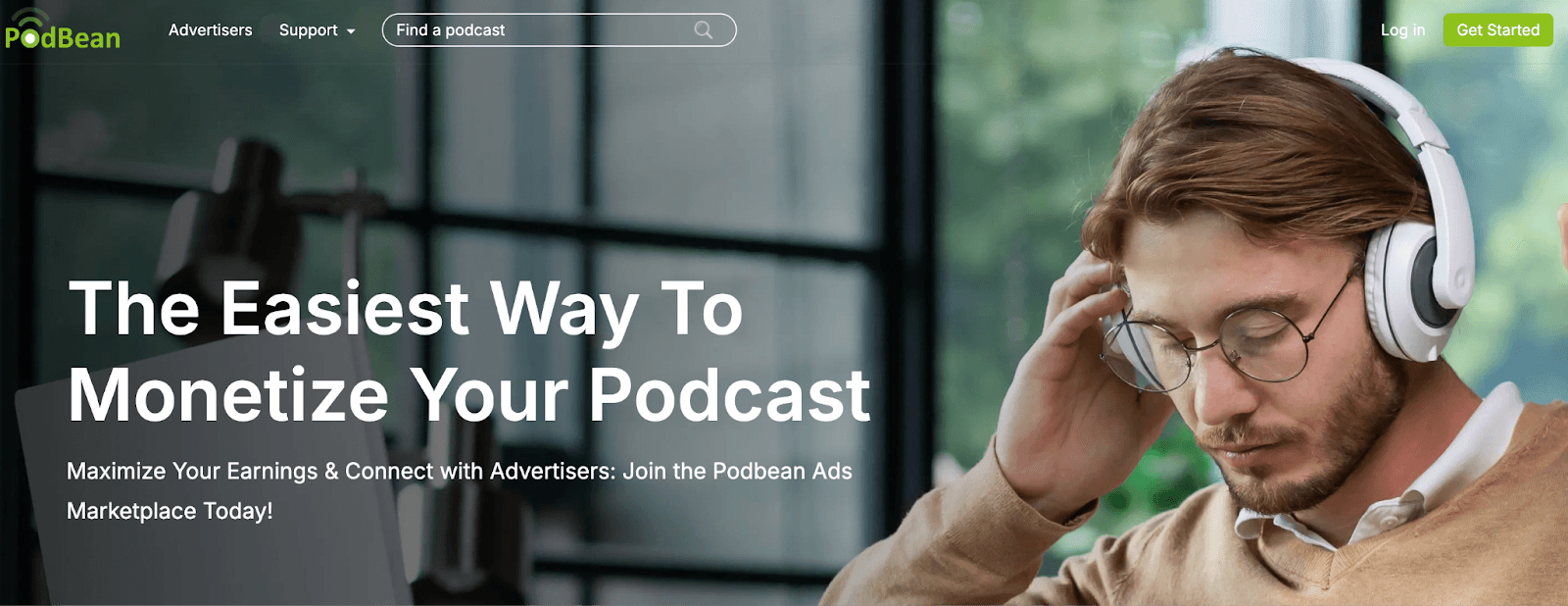
Podbean's ads marketplace taps into a huge network of DSPs and advertisers to maximize your earning potential. They make sure ads fit both your podcast's topic and your listeners' profile.
You'll also appreciate their straightforward payment system: track your earnings easily and count on consistent payouts.
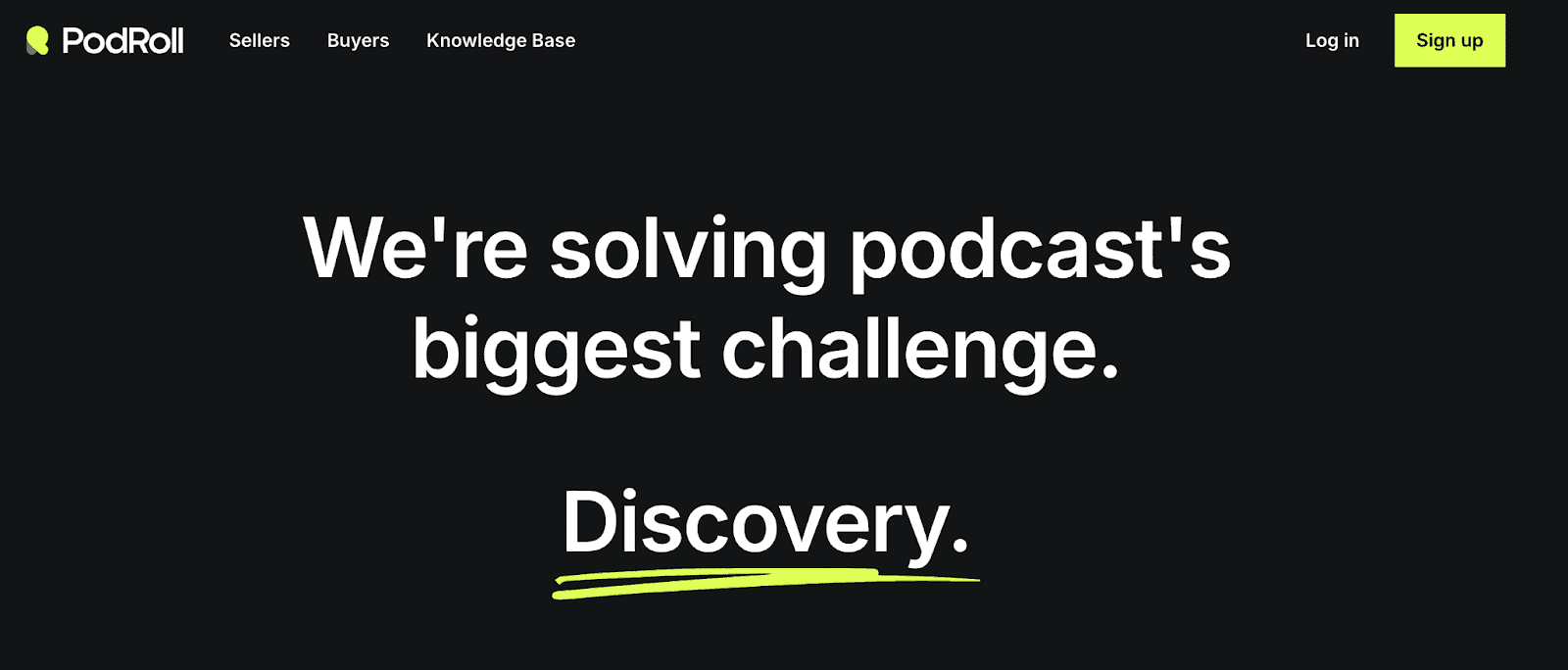
PodRoll offers something unique: they place your episodes in popular podcast feeds to create a fresh revenue stream, without messing with your existing ads.
You stay in charge of your content by approving what runs in your feed right from the PodRoll dashboard.
Look at who's sponsoring similar shows
Want another simple way to find sponsors? Pay attention to which businesses are supporting podcasts like yours.
Make a list of these companies and reach out with a personal touch. Send them your media kit and explain what makes your show special. Keep reaching out regularly, and you'll build a steady flow of new sponsors interested in your podcast.
Attend industry events and conferences
Nothing beats meeting potential sponsors face to face at podcast industry events and conferences.
You can attend well-known events like Podcast Movement, Podfest Expo, NAB Show, International Broadcasting Convention (IBC), and On Air Fest.
These meetups are perfect for connecting with potential sponsors and picking up the latest tips on monetization.
List your show on popular directories
Listing your podcast on well-known directories expands your reach and helps sponsors find you. Here are the top podcast directories:
Pick a podcast host that handles automatic publishing and creates a standard RSS feed — this gets your episodes everywhere they need to be.
Many offer built-in ways to make money from your show, making them extra valuable when you're ready to grow your podcast.
The key to negotiating sponsorship deals
Want to land great sponsorship deals? Let's talk about negotiation strategies that work.
Start by knowing your worth. Gather solid stats about your show — audience size, listener details, and engagement numbers. These facts make your podcast more attractive to sponsors.
Keep negotiations real and transparent. Build trust by being upfront about what you can deliver. Talk through all the legal details and spell out exactly what sponsors get. Make it clear how you'll track and report their ad performance.
And when it comes to money? Go for rates that match your show's quality and reach, staying in line with what's standard in podcasting.
Ready to monetize your podcast?
Take these strategies and run with them. Create a solid media kit, tap into advertising marketplaces, and connect with companies that fit your show.
Your voice matters, and there are people out there ready to support what you create.
Time to take that next step!
Ever notice how many podcasts disappear after just a few episodes? Here's a surprising fact: 94% of shows never make it to episode 100. But here's what many new podcasters miss: you don't have to wait until you're "big" to start making money from your show.
Most people think you need thousands of listeners before sponsors will notice you. After working with both new and established podcasters, we've discovered something different: you might be able to land sponsors earlier than you expect.
Let's talk real numbers. Right now, podcast publishers typically earn $25 to $50 for every 1,000 downloads. That adds up — successful shows bring in anywhere from $700 to $13,000 monthly. Not bad for talking about what you love, right?
In this guide, we're diving into exactly how to make this happen for your show. You'll learn how to catch sponsors' attention, create a media kit that gets responses, and price your spots to close more deals.
What you need to land podcast sponsors
First things first, there are a few things you’ll want to have ready to open doors to sponsorship deals.
Your podcast media kit
Think of your media kit as your podcast's resume — it's the first thing sponsors look at. Here's everything you'll want to include:
Here are the components to include in your podcast sponsorship proposal:
About Your Show and About The Host (Yourself)
Podcast Overview (Description and Genre)
Audience Demographics and Listening Stats
Download Numbers
Social Media Engagement and Follower Counts
Advertising Options (Pre-roll, Mid-roll, Post-roll)
Testimonials and Listener Reviews
Notable Achievements or Awards
Previous Guests or Topics Covered
Audio or Video Trailer/Snippets
Sponsorship and Partnership Opportunities
Contact Information
Links to Podcast Platforms, Website, and Social Media
Ad rates in 2024
Here’s an overview of ad spots available in a podcast episode and how much they usually cost:
Pre-roll Ad CPM: ~$15 for 15-25 seconds
Cost for 100,000 listens (Pre-Roll): ~$1,500
Mid-roll Ad CPM: ~$30 for 30-60 seconds
Cost for 100,000 listens (Mid-Roll): ~$3,000
Post-roll Ad CPM: ~$10 for 15-25 seconds
Cost for 100,000 listens (Post-Roll): ~$1,000
What affects these rates? A few things:
Podcast Popularity: More listeners = higher CPM
Ad Length: Longer ads cost more
Host-read Ads: Priced higher than traditional ads
Campaign Length: Longer campaigns might mean better rates
Number of Ad Spots: Buying multiple spots can affect pricing
Listener Demographics: Niche audiences often mean higher CPM
Social Influence: Strong social media presence can boost rates
Your inventory: types of ads you can offer
Keep an updated inventory of available ad slots and any special promotional opportunities. This helps sponsors see the flexibility and variety of advertising options your podcast offers.
Here are some of the top podcast ad choices preferred by brands that you can include in your sponsorship proposal:
Pre-Roll Ads
Mid-Roll Ads
Post-Roll Ads
Host-Read Ads
Custom Episode Intros/Outros
Exclusive Episode Sponsorships
Sponsorship Mentions
Sponsored Segments
Live Reads
Product Placement
Custom Content Series
Ad-Free Episodes for Subscribers
Branded Show Notes
Collaborative Episodes
Promo Code Mentions
Banner Ads on Podcast Website
Social Media Shoutouts
Email Newsletter Features
Why brands love podcast advertising
This stat won’t surprise you: 61% of brands use podcast ads for brand building.
It makes sense — podcast advertising helps businesses connect with exactly the right people and grow their customer base. Let's break down why brands get excited about podcast ads:
They can reach their perfect match
With podcasting, brands can reach their buyers in a very targeted way.
BuzzSprout found that half of all listeners aged 35-44 tune in monthly, with 22% of the 55+ crowd joining in too.

When you run a niche podcast, sponsors can fine-tune their message to match your listeners' interests perfectly. Here's the kicker: podcast ads deliver 4.9 times return on investment — beating out traditional advertising by a mile.
Your listeners are super engaged
Ever notice how podcast fans tend to be very engaged? About 40% of people are more likely to buy something after hearing it on a podcast versus seeing it on social media.

Brands love this because engaged listeners are more likely to become loyal customers. When your audience trusts you, they're more open to hearing about products that might actually help them.
Audio ads just hit different
There's something special about hearing an ad in someone's voice versus reading it on a screen. The proof is in the numbers: 74% of listeners visit company websites after hearing podcast ads, 72% think about buying, and 54% actually go to stores to check products out.
That's the power of audio advertising at work.

Trusted voices = better results
Here's something that makes advertisers' eyes light up: 71% of weekly podcast fans jump on new episodes within 24 hours of release.
When a familiar voice recommends something, it carries more weight — that's why 85% of people trust podcasts more than other news sources. That trust translates into action, from website visits to actual purchases.
Meet the brands betting big on podcasts
The podcast world is booming — we’re talking 546 million listeners worldwide, and advertisers are taking notice. By 2027, experts predict podcast advertising will hit a whopping $5.03 billion. That's not pocket change.
You'll spot plenty of familiar names in the podcast advertising space: Toyota, Squarespace, Amazon Music, Nissan, and Walmart, just to name a few.
Some brands are going all in, so let's look at the top three podcast advertisers in the U.S. BetterHelp leads the pack, dropping $24.6 million on podcast ads. Amazon isn't far behind at $15.6 million, and VGW rounds out the top three with $13.4 million.

The podcast advertising game isn't just for the big players. Plenty of smaller companies are jumping in too, seeing real results in brand awareness and sales. In fact, some of the most interesting success stories come from businesses you might not have heard of yet.
Let's look at some real examples of how both small businesses and major brands have used podcast advertising to grow their audience:
What does this mean for you? Take a look at your podcast's topic. Which brands would be perfect matches for your listeners? These companies might be your future sponsors - they just don't know it yet.
The best part? Most companies aren’t aware of podcasts as an advertising medium and rely on other channels. You can be the one to open their eyes to the opportunity to be early movers in a space that’s still surprisingly open.
The types of ads you can offer
Let's talk about the different ways you can work with sponsors. Think of your podcast like prime real estate - different spots in your show have different values. Let's break down one of the most valuable spots:
Pre-roll ads
That's prime advertising territory, and here's why sponsors love it: listeners are fresh and ready to pay attention.
These ads get plugged in right at the start using something called dynamic ad insertion (fancy tech that makes switching out ads super easy). The best part? Most people don't skip the beginning of episodes, so sponsors know their message is actually getting heard.
Here's a real example that worked: Two Men and a Truck created a clever 30-second pre-roll ad for Spotify. They kicked it off with "Clutter can add up fast" - hitting a nerve with anyone who's ever felt overwhelmed by their stuff. Then they smoothly moved into their solution: trained movers, safe handling, and being there when you need them. Smart, right?

Mid-roll ads
By the time a listener hits the middle of your episode, they're hooked. They've settled in, they're invested in what you're saying, and they're actually paying attention. That's why mid-roll spots are so attractive to sponsors (and why they tend to cost more).
Here's what makes them extra special: you can weave these ads into your content naturally, almost like they're part of the conversation. And thanks to some clever tech called dynamic insertion, you can swap these ads in and out without having to re-edit your whole episode. That means your sponsors can keep their messages fresh and timely.
Take David Tennant's podcast, for example. In a recent episode where he interviewed Elizabeth Moss, he smoothly worked in some ads about 30 minutes in, right when listeners were deep into the conversation. The ads promoted other network shows, and because they were programmatic (fancy word for automatically inserted), they could be updated whenever needed.

Post-roll ads
As you can deduce by now, these are ads placed at the end of an episode. While they might not grab as many ears as ads at the beginning or middle of your show, these end-of-episode spots have their own special power.
Here's the thing about listeners who make it to the end of your show: they're your super fans. They stuck around for the whole ride, which means they're more likely to pay attention to what you're recommending. And for sponsors? That kind of dedicated audience is pure gold.
You've got plenty of flexibility with post-roll ads too. Maybe one sponsor wants a quick 30-second spot while another needs more time to tell their story — you can make either work. Plus, since you're recording these ads ahead of time, you can make sure they flow perfectly with how your episode wraps up.
Host-read ads
Host-read ads are exactly what they sound like — you, talking about products you believe in. And guess what? These often turn out to be the most powerful ads of all.
Think about it. Your listeners tune in because they connect with your voice, your style, your take on things. When you weave a product recommendation into your natural flow, it doesn't feel like an interruption — it feels like getting advice from a friend. That's why listeners tend to remember these ads better than any other kind.
And here's some good news: technology's making this easier than ever. With programmatic host-read ads, you can customize your message for different listeners while keeping that personal touch that makes your show special.
Want to see this in action? Take a look at how BetterHelp does it. In episode 88 of The Ramsey Show, the host talked about online therapy in such a natural way, you might not have even realized it was an ad at first. It just felt like part of the conversation — and that's exactly why it worked.

Product placement
Ever notice how some podcast hosts casually mention products in a way that feels totally natural? That's product placement in action, and it's becoming a smart way to earn money from your show.
Here's the thing about podcasting — since listeners can't see what you're talking about, getting creative with how you introduce products into your story becomes super important. It's all about finding those perfect moments to weave products into your narrative in a way that feels authentic.
Think of it like having a friend naturally recommend something they love — that's the same feeling you're going for with product placement. When done right, these mentions actually add to your story instead of interrupting it.
Want to see this in action? Take the psychological thriller Listening In with Rachel Brosnahan. In one of their episodes, the way they incorporated Johnnie Walker into the story shows just how creative you can get with product placement — it felt like part of the story rather than an ad break.

Instead of just talking about Johnnie Walker, the show creators got clever with it. They sprinkled in little audio details that put you right there in the scene: the gentle clink of ice cubes, the unmistakable sound of whiskey being poured into a glass. These tiny touches did more than just mention the brand — they created a whole mood and made the product feel like a natural part of the story's world.
Affiliate sponsorships
Here's a revenue stream many new podcasters overlook: affiliate sponsorships. Think of it as getting paid to recommend products you actually use and love. There's no need to wait for big sponsors to notice you, and you can start earning passive income right away.
By joining podcast affiliate programs like Amazon Associates, Audible, ExpressVPN, Redbubble, BarkBox, you can add affiliate links right into your content and show notes.

Here's the best part — every time your listeners make purchases through your unique affiliate links, you earn a commission from these programs.
Pricing models: breaking down CPM vs. CPA
Let's talk about the two main ways podcast sponsors pay for ads: CPM and CPA.
CPM = “Cost Per Mille,” which is just a fancy way of saying how much advertisers pay for every 1,000 listens to their ad. Think of it as paying for eyeballs (or ears) on their message.
CPA = “Cost Per Acquisition,” which is where sponsors only pay when your listeners take action, like signing up for their service. It's all about results rather than just reaching people.
Let’s break this down further:

Beyond CPM and CPA, here are other pricing models you can offer sponsors, each with its perks:
Flat Rate: Keep it simple with a set fee for each sponsor spot, no matter how many downloads.
Programmatic Ads: Think of these as automated ad spots sold through networks. They typically earn less than host-read ads, but they're super easy to manage.
Monthly Retainer: Perfect for long-term partnerships, where sponsors pay the same amount each month like clockwork.
Dynamic Ad Insertion: This lets you pop ads into your older episodes too. The price changes based on reach and campaign duration.
Engaging with sponsors
Let's dive into the exciting part: getting your podcast sponsored. Finding the right sponsors isn't just about making money — it's about building relationships that last and creating income you can count on.
Here are the best ways to connect with advertisers who'll be a great fit for your show:
Getting support from listeners
Let's talk about one of the most straightforward ways to fund your podcast: asking your listeners for support. Here's a rundown of platforms that make it super easy to accept contributions:
Quick and Simple Donations
PayPal for easy one-time or recurring support
Buy Me a Coffee when listeners want to show quick appreciation
Ko-fi for fee-free contributions
Venmo and Cash App for instant transfers
Zelle for direct bank-to-bank support
Membership and Subscription Platforms
Patreon — offer exclusive content and tiered perks
Supercast — create premium ad-free episodes
Podfan — give special access and shout-outs
Podbean Patron — reward listeners with exclusive content
Substack — combine premium newsletters with your podcast
Fundraising Tools
GoFundMe for specific project goals
Fundly for special initiatives
Indiegogo when you're planning bigger expansions
Content Sales and Direct Support
Gumroad to sell extras like e-books or transcripts
Stripe for custom payment processing on your website
Anchor Listener Support built right into your podcast platform
PayPal.me for sharing your personal donation link
Liberapay for recurring support without platform fees
Hustle & Co for monthly subscription income
Reach out to sponsors like a pro
Looking to connect with potential sponsors directly? Here's how to make your outreach count.
Start by finding sponsors who truly fit your show, then craft an email that tells your podcast's story. Got a creative idea for them — like a mini-series that aligns with their brand? Don't be shy about pitching it.
Here are the numbers that make sponsors sit up and pay attention:
Who's listening? Break down your audience's age, location, and interests
How many people tune in to each episode
Your monthly growth trend
How your listeners engage through likes, shares, and comments
The percentage of listeners who stick around till the end
Your listener loyalty stats
Your social media presence and reach
Real feedback from your audience
Success stories from past sponsorships
How many people visit your website through the podcast
Pack all this into a clear, punchy pitch that shows sponsors exactly what they'll get — and don't forget to spell out your sponsorship options.
Here is an example a podcaster we know used to land a new sponsor:
Subject: Partnership Opportunity: Feature [Brand Name] in Our [Topic] Podcast
Hi [Sponsor’s Name],
I'm [Your Name], creator of [Your Podcast Name], where we dive into [content/theme]. I noticed that our audience — [relevant demographics] — matches perfectly with who you're trying to reach.
I've attached our media kit that shows our download numbers, listener details, and how we connect with our community on Instagram, Twitter, and Facebook.
Here's what makes us different: we offer a fresh format that keeps listeners hooked and gives your brand lasting exposure. We're planning a mini-series about [topic], and I think your brand would be a perfect fit.
I can already see how [mention brand/products] naturally fits into this conversation, and I'd love to explore ways to weave in your message that serves both our listeners and your goals.
Let me know if you’d be interested in exploring what’s possible.
Best,
[Your name]
Find sponsors through podcast marketplaces
Here's another way to connect with advertisers — tap into podcast advertising platforms that offer both automated and host-read opportunities. These marketplaces make it easier to grow your podcast revenue:

Podcorn is a top marketplace that treats podcasters like influencers when it comes to native advertising.
Here's what makes it great: you can jump right in and browse sponsorship opportunities without getting tied down by contracts. Plus, no long waits for your money — once your content is approved, you'll get paid within 24 hours.

AdsWizz is one of the biggest marketplaces in podcast advertising, reaching over 255 million monthly global unique listeners.
Their programmatic selling platform makes it simple to sell your audio ad space. Through their AudioMax SSP technology, podcasters can maximize their revenue by connecting with 80% of global advertisers.

Here's what makes Gumball special: they focus on host-read ads, connecting over 980 top brands with more than 1000 podcast creators.
The platform handles all the advertising tracking for you, and thanks to their LightningPay system, you'll get your earnings fast.

Libsyn Ads opens doors to all kinds of advertisers: you'll find everyone from up-and-coming startups to established brands.
Just add your podcast to their platform to unlock new advertising opportunities. Once you're in, their team helps create your marketplace listing and set up your ad spots. The best part? You keep full control over which ads appear on your show.

Acast handles the heavy lifting by hosting and distributing your podcast everywhere that matters: Apple Podcasts, Google Podcasts, Spotify, and beyond.
Their dynamic ad insertion lets you control exactly where ads go in your episodes while their team brings quality brands to the table. With innovative ad technology and a global sales force, Acast connects over 2,300 top advertisers with creators, helping you earn consistently.

Audioboom connects podcasters with top-tier advertisers while helping you build your brand alongside podcasting's biggest names.
Their Showcase feature brings you a global advertising marketplace where you can target campaigns by genre, location, keywords, and listener demographics using dynamic ad insertion. Better yet, you'll get your own account manager and access to detailed insights powered by IAB Podcast Measurement Standard 2.1 certified partners like Triton Digital and Voxnest, giving you great tools to hit your revenue goals.

Podbean's ads marketplace taps into a huge network of DSPs and advertisers to maximize your earning potential. They make sure ads fit both your podcast's topic and your listeners' profile.
You'll also appreciate their straightforward payment system: track your earnings easily and count on consistent payouts.

PodRoll offers something unique: they place your episodes in popular podcast feeds to create a fresh revenue stream, without messing with your existing ads.
You stay in charge of your content by approving what runs in your feed right from the PodRoll dashboard.
Look at who's sponsoring similar shows
Want another simple way to find sponsors? Pay attention to which businesses are supporting podcasts like yours.
Make a list of these companies and reach out with a personal touch. Send them your media kit and explain what makes your show special. Keep reaching out regularly, and you'll build a steady flow of new sponsors interested in your podcast.
Attend industry events and conferences
Nothing beats meeting potential sponsors face to face at podcast industry events and conferences.
You can attend well-known events like Podcast Movement, Podfest Expo, NAB Show, International Broadcasting Convention (IBC), and On Air Fest.
These meetups are perfect for connecting with potential sponsors and picking up the latest tips on monetization.
List your show on popular directories
Listing your podcast on well-known directories expands your reach and helps sponsors find you. Here are the top podcast directories:
Pick a podcast host that handles automatic publishing and creates a standard RSS feed — this gets your episodes everywhere they need to be.
Many offer built-in ways to make money from your show, making them extra valuable when you're ready to grow your podcast.
The key to negotiating sponsorship deals
Want to land great sponsorship deals? Let's talk about negotiation strategies that work.
Start by knowing your worth. Gather solid stats about your show — audience size, listener details, and engagement numbers. These facts make your podcast more attractive to sponsors.
Keep negotiations real and transparent. Build trust by being upfront about what you can deliver. Talk through all the legal details and spell out exactly what sponsors get. Make it clear how you'll track and report their ad performance.
And when it comes to money? Go for rates that match your show's quality and reach, staying in line with what's standard in podcasting.
Ready to monetize your podcast?
Take these strategies and run with them. Create a solid media kit, tap into advertising marketplaces, and connect with companies that fit your show.
Your voice matters, and there are people out there ready to support what you create.
Time to take that next step!
Make videos people actually want to watch.
Learn how video content can help you stand out and build a huge audience.
Make videos people actually want to watch.
Learn how video content can help you stand out and build a huge audience.
Make videos people actually want to watch.
Learn how video content can help you stand out and build a huge audience.

